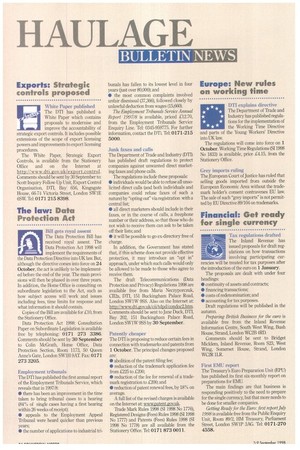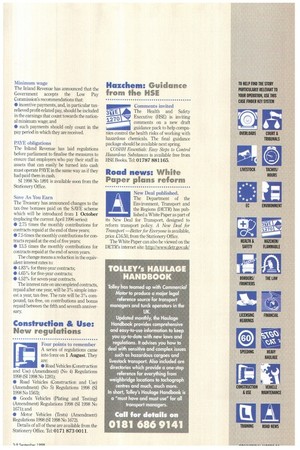Financial: Get ready for single currency Tax regulations drafted The
Page 36

Page 37

If you've noticed an error in this article please click here to report it so we can fix it.
Inland Revenue has issued proposals for draft regulations on how transactions involving participating currencies will be treated for tax purposes after the introduction of the euro on 1 January.
The proposals are dealt with under four headings: • continuity of assets and contracts; • financing transactions; • costs of redenomination; and • accounting for tax purposes.
Draft regulations will be published in the autumn.
Preparing British Business for the euro is available free from the Inland Revenue Information Centre, South West Wing, Bush House, Strand, London WC2B 4RD.
Comments should be sent to Bridget Micklem, Inland Revenue, Room S23, West Wing, Somerset House, Strand, London WC2R 1LR.
First EMU report
The Treasury's Euro Preparation Unit (EPU) has published its first six-monthly report on preparations for EMU.
The main findings are that business is responding positively to the need to prepare for the single currency but that more needs to be done for smaller companies.
Getting Ready for the Euro: first report July 1998 is available free from the Public Enquiry Unit, Room 89/2, HM Treasury, Parliament Street, London SW1P 3AG. Tel: 0171-270 4558.
Minimum wage The Inland Revenue has announced that the Government accepts the Low Pay Commission's recommendations that: • incentive payments, and, in particular taxrelieved profit-related pay, should be included in the earnings that count towards the national minimum wage; and • such payments should only count in the pay period in which they are received.
PAYE obligations The Inland Revenue has laid regulations before parliament to finalise the measures to ensure that employers who pay their staff in assets that can easily be turned into cash must operate PAYE in the same way as if they had paid them in cash.
SI 1998 No 1891 is available soon from the Stationery Office.
Save As You Earn The Treasury has announced changes to the tax-free bonuses paid on the SAYE scheme which will be introduced from 1 October (replacing the current April 1996 series): • 215 times the monthly contributions for contracts repaid at the end of three years; • 7.5 times the monthly contributions for contracts repaid at the end of five years; • 13.5 times the monthly contributions for contracts repaid at the end of seven years. The change means a reduction in the equivalent interest rates to: • 4.83% for three-year contracts; • 4.65% for five-year contracts; • 4.52% for seven-year contracts.
The interest rate on uncompleted contracts, repaid after one year, will be 3% simple interest a year, tax-free. The rate will be 3% compound, tax-free, on contributions and bonus repaid between the fifth and seventh anniversary












































































































